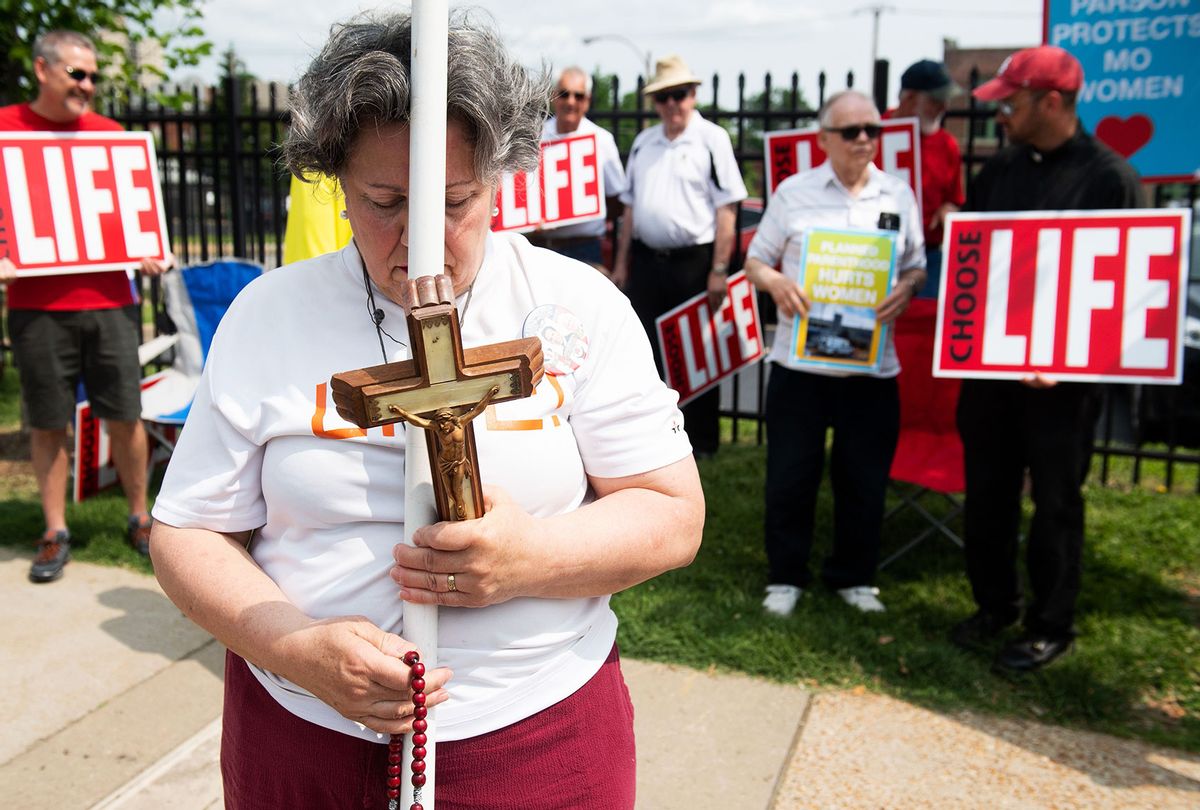Conservative policymakers nationwide are on a crusade to crush women's right to choose. But this war isn't being waged based on science, the Constitution, or anything else that elected leaders should actually consider in their decision-making. It's grounded in a fundamentally warped interpretation of Christianity.
Indeed, when Texas Gov. Greg Abbott signed his state's draconian abortion bill into law — which empowers citizens to sue anyone who helps a woman obtain an abortion after six weeks of pregnancy — he proclaimed, "Our creator endowed us with the right to life, and yet millions of children lose their right to life every year because of abortion." Mississippi Attorney General Lynn Fitch, who filed a brief calling on the Supreme Court to overturn Roe v. Wade, recently stated that the case was "chosen by God."
As a Christian, a biblical scholar, and a mother, it is infuriating that lawmakers would twist and distort our sacred text to give the government the power to force women to carry a child to term. The Bible doesn't say that abortion is a sin and has no explicit definition of when life begins. The reality is that abortion only became a rallying cry for conservative Christians — and particularly Evangelicals — when Republicans decided it was politically advantageous to do so.
RELATED: Evangelical theology is what made the Texas abortion outrage possible
It may come as a surprise, but the Christian movement against abortion is actually relatively new. Through most of the 1900s, evangelical Christians — who are the powerhouses of today's anti-abortion push — didn't say much about the subject, or even explicitly noted the issue should not be touched by the government. Indeed, a 1970 poll from the Baptist Sunday School Board revealed that a whopping seven in ten Baptist pastors supported abortion to protect the mental or physical health of the child-bearer. And in 1976, 1977 and 1979, the Southern Baptist Convention issued resolutions stating that they affirm their "conviction about the limited role of government in dealing with matters relating to abortion."
Want a daily wrap-up of all the news and commentary Salon has to offer? Subscribe to our morning newsletter, Crash Course.
So how did the anti-abortion movement become so engrained in conservative Christianity? One word: politics. In the 1970s, conservative political activists were increasingly alarmed by desegregation efforts, particularly in schools, and were hoping to shore up the Republican base to preserve racial boundaries. But they struggled to identify an issue that would fire up white Evangelicals — a key part of the base — without being explicitly racist. Through careful research, they discovered that some Evangelicals were concerned about abortion and could be riled up to fight against it. So, activists made that a core issue, and ignited a national movement to end the practice.
Fast-forward to today, and many Republicans say that their Christian faith requires them to ban abortion. But it is clear to me that the Christian faith requires protecting the lives and well-being of women by allowing them reproductive freedom, not taking steps to eliminate it. In the Bible, God consistently tells us that all humans are moral agents, fully capable of making their own decisions.
Texas' law is particularly un-Christian. If reignited, a woman in an abusive relationship who seeks an abortion could be turned in to authorities by her husband — and he would come away with thousands of dollars. A mother who helps her young teenage daughter get an abortion could be prosecuted, tearing a loving family apart. A woman who discovers that her fetus has a fatal abnormality would be forced to go through labor regardless and undergo immense emotional trauma.
It's important to understand another crucial flaw in the anti-abortion Evangelical movement: The notion that life begins at conception is a very conservative, Christian idea. The government cannot legally impose this interpretation upon others, especially since other faiths directly contradict this belief.
Consider Judaism, for instance. Jewish law doesn't consider a miscarriage to be a death, so devastated parents don't say Kaddish, the Jewish mourning prayer, for a dead embryo or fetus.
The Talmud, a widely-utilized Jewish text, notes that a fetus is only considered to have a soul when the head has emerged. And the Tzitz Eliezer, another famous text, states that an Israelite woman can undergo an abortion, "even when there is no direct threat to the life of the mother, but merely a need to save her from great pain."
The bottom line is, no government should have the power to force women to carry a pregnancy to term. Any faith leaders who say otherwise are willfully mischaracterizing the teachings of their religions — and taking steps that are actively harmful to countless people. It's hard to think of anything that stands in starker opposition to the compassion that is at the heart of every major faith.
More stories on the fight to protect abortion rights:



Shares